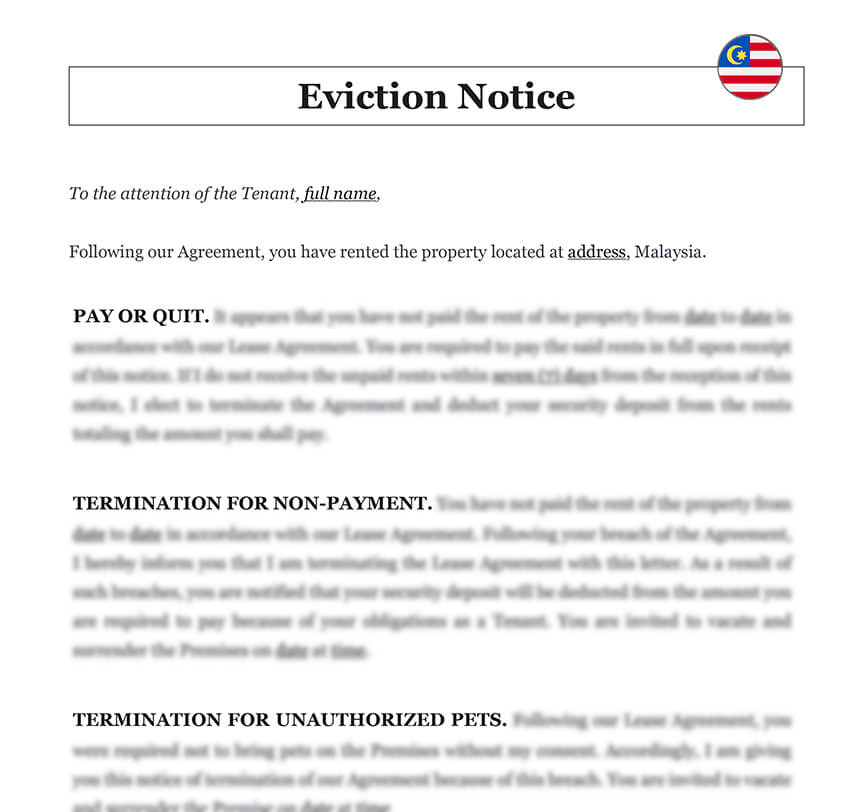Ready to use legal template
Drafted by experienced lawyers
Compliant with Hong Kong law
Ready to use legal template
Drafted by lawyers
Compliant with Hong Kong law
Home › Rent your property › Eviction notice
Learn more about Eviction Notice in Hong Kong
An Eviction Notice is a formal legal document that a landlord issues to a tenant to terminate a tenancy due to specific reasons, such as non-payment of rent, lease violations, or the landlord’s need to reclaim the property. In Hong Kong, eviction procedures must comply with the Landlord and Tenant (Consolidation) Ordinance (Cap. 7) to ensure fairness and legal enforceability. A properly drafted Eviction Notice Letter provides tenants with clear instructions on vacating the property, including the required notice period and any legal consequences for non-compliance. It is crucial for landlords to follow the correct legal process to avoid disputes or unlawful eviction claims. Our Eviction Notice Letter is drafted by lawyers, fully compliant with Hong Kong’s rental laws, and available in an easy-to-edit Word format. Download now to ensure your eviction process is legally sound and properly documented.
Table of contents
-
-
What is an Eviction Notice in Hong Kong?
-
What is included in this Eviction Notice Letter?
-
Is an Eviction Notice legally required in Hong Kong?
-
How do I serve an Eviction Notice in Hong Kong?
-
What happens if a tenant refuses to leave?
-
Can I issue an Eviction Notice for non-payment of rent?
-
How much notice must be given in an Eviction Notice?
-
Can a landlord change the terms of the Eviction Notice?
-
What should I do if I receive an Eviction Notice in Hong Kong?
-
What is an Eviction Notice in Hong Kong?
An eviction notice in Hong Kong is a formal legal document issued by a landlord to inform a tenant that their tenancy agreement is being terminated and that they are required to vacate the property by a specified date. This notice is typically used in cases where the lease has expired, the tenant has breached the lease terms, or the landlord has other lawful grounds for termination. To be legally enforceable, the eviction notice must comply with the requirements of the Landlord and Tenant (Consolidation) Ordinance, including proper notice periods, clear grounds for termination, and formal delivery. Issuing an eviction notice without legal justification or in violation of the lease terms can result in disputes and legal challenges, so it is essential that landlords follow the correct legal procedures.
ℹ️ Secure your rental terms with a legally sound Lease Agreement tailored to your needs.
What is included in this Eviction Notice Letter?
A Hong Kong eviction notice letter should include the following key elements:
| ➤ Tenant Information: The notice is addressed to the tenant by full name, specifying the rented property’s address in Hong Kong. |
| ➤ Non-payment of Rent: The tenant is notified of unpaid rent from a specified period, with a demand for payment within fourteen (14) days. Failure to pay will result in termination of the lease and deductions from the security deposit. |
| ➤ Termination for Non-payment: In the case of continued non-payment, the lease is terminated, and the tenant is instructed to vacate the property by a specified date and time. |
| ➤ Termination for Unauthorized Pets: The tenant is informed that keeping pets without the landlord’s consent is a breach of the lease, leading to termination and a request to vacate by a specific date and time. |
| ➤ Termination for Property Damages: If the tenant has caused damage to the property, the landlord can terminate the lease, deduct repair costs from the security deposit, and require the tenant to vacate by a specific date and time. |
| ➤ Unauthorized Sublease: The tenant is informed that subletting without the landlord’s consent is a breach of the lease, leading to termination of the agreement and a demand to vacate. |
| ➤ Legal Framework: The notice refers to the legal framework applicable in Hong Kong, highlighting that the landlord’s remedies are in accordance with local laws. |
| ➤ Signature and Issuance: The notice is signed by the landlord and specifies the issuance date. |




